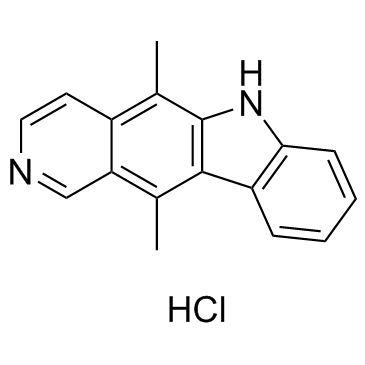Ellipticine hydrochloride |
| Catalog No.GC35973 |
Ellipticine (NSC 71795) hydrochloride is a potent antineoplastic agent; inhibits DNA topoisomerase II activities.
Products are for research use only. Not for human use. We do not sell to patients.

Cas No.: 5081-48-1
Sample solution is provided at 25 µL, 10mM.
Ellipticine (NSC 71795) hydrochloride is a potent antineoplastic agent; inhibits DNA topoisomerase II activities. Topoisomerase II
Ellipticine (NSC 71795) is a potent antineoplastic agent exhibiting the multimodal mechanism of its action. The mechanisms of Ellipticine (NSC 71795) antitumor, mutagenic and cytotoxic activities are suggested to be intercalation into DNA and inhibition of DNA topoisomerase II activity. Another mode of Ellipticine (NSC 71795) action is the formation of covalent DNA adducts mediated by its oxidation with cytochromes P450 (CYP) and peroxidases[1]. Ellipticine (NSC 71795) can also act as an inhibitor or inducer of biotransformation enzymes, thereby modulating its own metabolism leading to its genotoxic and pharmacological effects. Treatment of cells with Ellipticine (NSC 71795) results in inhibition of cell growth and proliferation. This effect is associated with formation of two covalent Ellipticine (NSC 71795)-derived DNA adducts[2].
Ellipticine (NSC 71795) treatment results in ellipticine-derived DNA adduct generation in several healthy organs (liver, kidney, lung, spleen, breast, heart and brain) and in DNA of mammary adenocarcinoma. The levels of Ellipticine (NSC 71795)-derived DNA adducts generated in these adenocarcinomas are almost 2-fold higher than in normal healthy mammary tissue. The induced expression of cytochrome b5 protein in liver of rats treated with Ellipticine (NSC 71795) suggests that cytochrome b5 may modulate the CYP-mediated bioactivation and detoxification of Ellipticine (NSC 71795)[3].
[1]. Stiborova M, et al. Molecular mechanisms of antineoplastic action of an anticancer drug ellipticine. Biomed Pap Med Fac Univ Palacky Olomouc Czech Repub. 2006 Jul;150(1):13-23. [2]. Stiborova M, et al. Ellipticine cytotoxicity to cancer cell lines - a comparative study. Interdiscip Toxicol. 2011 Jun;4(2):98-105. [3]. Stiborova M, et al. The anticancer drug ellipticine activated with cytochrome P450 mediates DNA damage determining its pharmacological efficiencies: studies with rats, Hepatic Cytochrome P450 Reductase Null (HRN•) mice and pure enzymes. Int J Mol Sci. 2014 Dec 25;16(1):284-306.
Average Rating: 5 (Based on Reviews and 40 reference(s) in Google Scholar.)
GLPBIO products are for RESEARCH USE ONLY. Please make sure your review or question is research based.
Required fields are marked with *




















